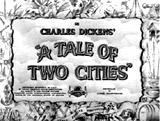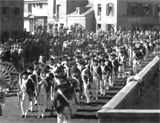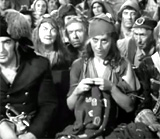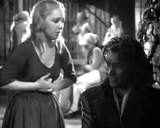
|
A Tale of Two Cities (1935)
In director Jack Conway's and MGM's interpretation
of the classic 1859 Charles Dickens story of the French Revolution
and the Reign of Terror:
- the film's opening title card: "It was the best
of times, it was the worst of times, it was the season of Light,
it was the season of Darkness, we had everything before us, we
had nothing before us....in short, it was a period very like the
present..."
- after learning that her father Dr. Alexandre Mannette
(Henry B. Walthall) was not dead, but had been unjustly imprisoned
in the infamous Bastille in France for 18 years, pretty French
girl Lucie Manette (Elizabeth Allan) went to Paris; in a stirring
scene, she was reunited with her bearded, broken-down father in
an upstairs room of a tavern owned by Ernest Defarge (Mitchell
Lewis), and his wife Madame Defarge (Blanche Yurka) (who were
instigating a plot to overthrow the government); Lucie brought
her father back to England to recover from his incarceration
|
The Main Characters
|

Lucie Manette (Elizabeth Allan)
|

Lucie's Father Dr. Alexandre Mannette (Henry B.
Walthall)
|

Marquis de St. Evremonde (Basil Rathbone)
|

Ernest Defarge (Mitchell Lewis) wife Madame Defarge (Blanche
Yurka)
|

Charles Darnay (Donald Woods) - the Marquis' Nephew
|

Lawyer Sydney Carton (Ronald Colman)
|
- the vicious French aristocrat Marquis de St. Evremonde
(Basil Rathbone) was introduced as heartless and cruel when his
speeding carriage ran over and killed a poor French peasant boy
in the streets of Paris outside the Defarge's shop; he emerged
from his carriage and callously and remorselessly told the onlookers:
"It's extraordinary to me that you people cannot take care of yourselves
and your children. One or the other of you is forever in the way.
How do you know what injury you might do to my horses?"
- the callow and idealistic French aristocrat Charles
Darnay (Donald Woods) announced to his disreputable
and vicious uncle, the Marquis de St. Evremonde, that he was giving
up his title and rank and emigrating to England; on their passage
to England, he met
Lucie and became her fiancee (and eventually they married)
- soon after Darnay arrived in England, the
Marquis framed
his nephew for treason - Darnay was charged with spying against
England: (Newspaper Article: "Lists of His Majesty's forces have
been found in the possession of one Charles Darnay, a young Frenchman");
he was apprehended and held for trial at the Old Bailey
- dissipated and frequently drunk English lawyer Sydney
Carton (Ronald Colman) agreed to defend Darnay in court; just before
the trial, the cunning Carton was able to get the main prosecution
witness, a banker named Barsad (Walter Catlett) during a drinking
bout, to admit that Darnay was framed; when Carton turned to reveal
himself in court that he was Darnay's defense lawyer, the defendant
was soon after acquitted
- at the same time, Carton expressed his devotion
and love for Lucie: ("I wonder if you know how much your happiness
means to me"), although was surprised and taken aback when
she announced that she was marrying Charles Darnay
- during the French Revolution at this time - an
uprising grew in France between the peasants and the aristocrats,
and many people lost their lives to the guillotine; the Marquis
was stabbed to death while he slept by one of the Jacques (Barlowe
Borland) - the father of the young boy who was run over by the
Marquis' coach; he left a note: "Drive him fast to his tomb - This
from Jacques"
- in a quiet moment between Carton and Lucie, Carton
admitted how she had inspired in him steadfast devotion and unrequited
love for her: "I would embrace any sacrifice for you and for those
dear to you. Will you hold me in your mind as being ardent and
sincere in this one thing? Think now and then that there is a man
who would give his life to keep a life you love beside you?"; he
was heartbroken about a romance that could have been between them
- at the time of revolutionary fervor in France in
1789, the enraged peasants were eager to revolt against the aristocracy;
they attacked a gated mansion where a servant was heartlessly feeding
slabs of meat to dogs; a montage of images were accompanied by
superimposed text - "Why?" - before the epic scene of the storming
of the Bastille; the peasants were able to destroy the moat and
enter, but were pushed back - until a contingent of French troops
arrived to fire at the Bastille and join them in revolution: "Unheralded,
unexpected Frenchmen in uniform joined Frenchmen in rags...and
Rebellion turned to Revolution" - and The Bastille surrendered;
"Hatred and Bloodlust" were the result of mob rule, as nobles fled
or died

|

|

|

|

|

|
|
Epic Sequence: The Storming of the Bastille
|
- Darnay
returned to Paris to save his old tutor Gabelle (H.B. Warner) (who
was associated with the Marquis) from execution by guillotine;
Darnay had actually been tricked to return - and was immediately
arrested, imprisoned
by revolutionaries in Paris, and brought before a 'kangaroo court'
- the unforgettable image of the evil and vengeful
Mme. Defarge who knitted as Darnay (and other victims)
were unjustly condemned; she delivered an impassioned speech against
the aristocracy during Darnay's trial, and Darnay was found guilty
for essentially being the last surviving Evremonde ("I demand the
life of the last of the Evremondes! I demand it!") - he was sentenced,
as an "enemy of the Republic," to be executed by guillotine "within
48 hours"

Head Judge of 'Kangaroo Court'
|

Darnay's Trial - Charged With Being an "Enemy of the Republic"
|

Madame Defarge Knitting During Darnay's 'Trial'
|

Madame Defarge's Speech Against Darnay
|
|
Darnay's Trial and Sentencing
|
- to protect Lucie, Carton arranged for her to leave
Paris and then visited Darnay in the Bastille to allegedly interview
him, but in fact to prove his love for Lucie; Carton dictated a
letter for Darnay to write to Lucie: ("I said that if ever I could
do anything for you...") before chloroforming him; he added in
his own handwriting: ("In the long night that is approaching, I
shall be guided by the memory of your kindness. God bless you for
your sweet compassion. Sydney Carton"); and then because of
their physical resemblance, he switched clothes and places with
him, in order to save him from the guillotine
- Madame Defarge went to seek further retribution
against Lucie in her apartment, although she was impeded by Lucie's
servant and companion Miss Pross (Edna May Oliver) who chastised
the Madame: ("You evil woman. You've killed many innocent people.
No doubt you'll kill many more; but my ladybird you shall never
touch") - in the ensuing struggle when a gun was pulled out, Madame
Defarge was shot and killed; shortly later, Darnay joined Lucie
and was able to escape back to England
- in one of the final scenes while in a holding cell,
Sydney Carton expressed
how he was courageous and unafraid to another innocent victim,
a seamstress (Isabel Jewell); she wondered about his motive
to save his "friend" and thus gained strength from
him: "You're
going to die in his place. Why?...You're so brave. When we
go to the guillotine, will you let me hold your hand? That
might give me courage, too"; he responded: "Yes, I'll
hold it to the last"
- when a loud jolt came from the guillotine as a head
was chopped off, a peasant woman nearby complained and snarled
that she had dropped a stitch: "I dropped a stitch. Cursed aristocrats!"
- as the Seamstress and Carton stood at the foot of
the guillotine, he stressed to her: "Keep your eyes
on me. Mind nothing else"; she responded: "I can bear it as
long as I'm with you. But when I go, will they be quick?"; he told
her: "It will be"; then she noticed how calm he was: "You're not
afraid. The others are only pretending, but you - It's almost
as if you welcomed it"; he affirmed his brave self-sacrifice (and
redemption by love): "Perhaps I do. Perhaps in death, I receive
something I never had in life. I hold a sanctuary in the hearts
of those I care for"; he kissed her as her number (# 22) was called
and she was led away - he was unable to hold her hand
- when he
ascended the scaffold during a drum-roll as his number (#23)
was called, Carton nobly delivered his last
words after the camera rose up and panoramically viewed the sky
and heavens above: ("It's
a far, far better thing I do than I have ever done. It's a far, far
better rest I go to than I have ever known..."); the final superimposed
title card was a Biblical quote: "I am the Resurrection and the Life:
he that believeth in me, though he were dead, yet shall he live"

Carton Led Up the Steps to His Fate
|

(off-screen): "It's a far, far better thing..."
|

Camera Rising Up Above Guillotine to View the Heavens
|
|

Opening Title Card

Lucie and Darnay Meeting on Their Way to England

Banker Barsad Tricked Into Admitting to Carton that Darnay was Framed

Darnay Revealing Himself in Court to Barsad

Carton's Love For Lucie - Although She Announced that
She Was Marrying Darnay

Marquis Stabbed to Death During Sleep By Vengeful Peasant Jacques

Carton's Expression of His Steadfast Devotion For Lucie

Montage - Peasants On the Verge of Uprising

Carton's Dictated Letter to Lucie (in Darnay's Handwriting)

Carton's Addition to the Letter (in His Handwriting)

Madame Defarge Shot and Killed in Struggle with Miss Pross


Awaiting Execution, A Distressed Seamstress Spoke to Carton About His Bravery


Riding In an Open Cart - to the Guillotine

Madame Defarge's Companion - a Peasant Woman: "I dropped a stitch"


Sydney Carton with Seamstress at Foot of Guillotine -
Goodbye Kiss

Final Title Card - Superimposed on Heavens
|




















